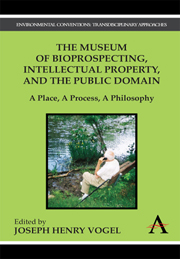 The Museum of Bioprospecting, Intellectual Property, and the Public Domain
The Museum of Bioprospecting, Intellectual Property, and the Public Domain Book contents
- Frontmatter
- Contents
- List of Figures
- Preface
- Acknowledgements
- Introduction: The Bauplan
- Chapter 1 Looking the Gorgon in the Face
- Chapter 2 Museums as Venues for Polemics
- Chapter 3 The Museum as a Vehicle for Considered Judgments on Access and Benefit Sharing
- Chapter 4 Clearing the Air: Applying the Intellectual Property Framework to National, Community, and Individual Rights in The Convention on Biological Diversity
- Chapter 5 The Anti-Commons Threat to Farmers' Rights: The Case of Crop Germplasm
- Chapter 6 The Moral Foundations of Intellectual Property and Conservation through Access and Benefit-Sharing
- Conclusions: The Nameless Interloper in The Museum of Bioprospecting, Intellectual Property, and the Public Domain
- Appendix: The Original Essay: A Proposal Based on “The Tragedy of the Commons:” Museum of Bioprospecting, Intellectual Property Rights, and the Public Domain
- Notes
- Index
Chapter 4 - Clearing the Air: Applying the Intellectual Property Framework to National, Community, and Individual Rights in The Convention on Biological Diversity
Published online by Cambridge University Press: 05 March 2012
- Frontmatter
- Contents
- List of Figures
- Preface
- Acknowledgements
- Introduction: The Bauplan
- Chapter 1 Looking the Gorgon in the Face
- Chapter 2 Museums as Venues for Polemics
- Chapter 3 The Museum as a Vehicle for Considered Judgments on Access and Benefit Sharing
- Chapter 4 Clearing the Air: Applying the Intellectual Property Framework to National, Community, and Individual Rights in The Convention on Biological Diversity
- Chapter 5 The Anti-Commons Threat to Farmers' Rights: The Case of Crop Germplasm
- Chapter 6 The Moral Foundations of Intellectual Property and Conservation through Access and Benefit-Sharing
- Conclusions: The Nameless Interloper in The Museum of Bioprospecting, Intellectual Property, and the Public Domain
- Appendix: The Original Essay: A Proposal Based on “The Tragedy of the Commons:” Museum of Bioprospecting, Intellectual Property Rights, and the Public Domain
- Notes
- Index
Summary
Rights over genetic resources and traditional knowledge (TK) are founded in the law and the protracted discussion over access and benefit sharing (ABS) is largely a question of the law. A primary task of the Museum of Bioprospecting, Intellectual Property, and the Public Domain (MUBIO) is to clarify a few basic facts of the:
legal commitment that States have “sovereign rights” over the genetic resources within their borders
complementary commitment to respect, preserve, recognize traditional knowledge (TK) and when consent is given, promote its wider application, and “encourage the equitable sharing” benefits derived from such knowledge
international recognition of the primary governance principles of due process of law, equal protection, and equity, and
trajectory of the Trade Related Intellectual Property (TRIPs) and bilateral free-trade accords.
Once such knowledge is acquired (Bloom's Level One), the visitor can begin to participate in the international conversation about the evolving Convention on Biological Diversity (CBD).
You mean to tell me, that after all that hullabaloo about climbing Bloom's pyramid, you're kicking me down from Level Six to Level One? (The interloper from the previous chapters seems especially irascible, irritated for having agreed to listen to more than one legal argument, after a lifetime of telling the joke about the blood in the water, the sharks, and professional courtesy.)
The manner in which the law deals with bioprospecting is a “lawyers derby” of academic publications and doctoral dissertations.
- Type
- Chapter
- Information
- The Museum of Bioprospecting, Intellectual Property, and the Public DomainA Place, A Process, A Philosophy, pp. 39 - 54Publisher: Anthem PressPrint publication year: 2010


